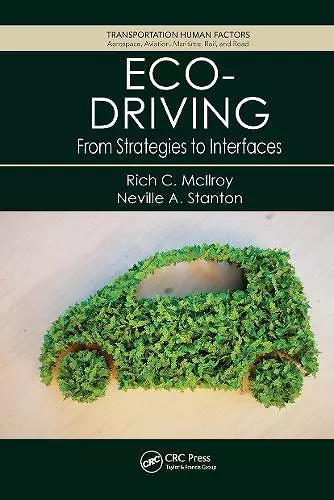Eco-Driving
From Strategies to Interfaces
Neville A Stanton author Rich C Mcllroy author
Format:Hardback
Publisher:Taylor & Francis Ltd
Published:18th Oct '17
Currently unavailable, and unfortunately no date known when it will be back

This book explores eco-driving's potential to conserve fuel and lower emissions, focusing on human factors, driver behavior, and the design of interfaces that enhance eco-driving practices for all vehicle operators.
Eco-Driving delves into the concept of eco-driving, which offers a promising approach to fuel conservation and emission reduction without necessitating modifications to vehicles or road systems. The book emphasizes the importance of understanding the human factors that influence eco-driving strategies and how these factors affect driver behavior. By addressing contemporary issues within this field, the text provides valuable insights for both practitioners and researchers interested in sustainable driving practices.
The author conducts a thorough review of existing literature related to design, behavior, and energy consumption, leading to an exploration of Ecological Interface Design. This framework is essential for understanding how drivers interact with their vehicles and the environment. The book also discusses the Skills, Rules, and Knowledge (SRK) taxonomy, which categorizes human behavior in relation to driving. This taxonomy is particularly relevant when considering how haptic feedback, such as that provided through the accelerator pedal, can enhance the eco-driving experience.
Ultimately, Eco-Driving posits that eco-driving techniques can be adopted by anyone operating a vehicle, making it an accessible and practical solution for reducing fuel consumption and emissions. By equipping drivers with the knowledge and tools necessary to implement eco-driving strategies, the book aims to promote more sustainable driving habits that can have a positive impact on the environment.
Eco-Driving: From Strategies to Interfaces comes at an important time for humans in our race towards saving our life-supporting environment. McIlroy and Stanton apply a Human Factors and Ergonomics approach to demonstrate how we might design vehicle interfaces to achieve significant reductions in harmful atmospheric emissions through enabling more responsible driver behaviour. McIlroy and Stanton raise an interesting set of questions for future researchers to build on such as human interactions with regenerative braking, the impacts on traffic system design, and which haptic displays may be appropriate.
Professor Andrew Thatcher, University of the Witwatersrand, South Africa.
With sustainability as a key design goal for road transport systems, the topic of eco-driving is gaining increasing importance. Despite this, there is still a considerable lack of literature addressing eco-driving behaviors as well as the question how to best support drivers. This book steps into this gap and addresses several core issues such as the eco-driving strategies drivers use, the cognitive structure of these strategies as well as the best ways to assist drivers. McIlroy and Stanton apply well-proven human factors methods expertly to this domain and compile a helpful and much-needed contribution, both for researchers and for practitioners.
Professor Thomas Franke, University of Lübeck, Germany
Technology is changing what it means to drive, and the race is on to define the next generation displays and controls. This design challenge requires not just rethinking vehicle displays, but also rethinking the theoretical basis of vehicle interface design. McIlroy and Stanton provide such a rethinking through a deep analysis of ecological interface design. Ecological interface design is a powerful approach, but is rarely applied to driving and rarely considers anything but a graphical interface. McIlroy and Stanton address these limits and extend ecological interface design to eco-driving. This is an excellent demonstration of how to think differently about interface design for cars.
Professor John D. Lee, University of Wisconsin-Madison, USA
ISBN: 9781138032019
Dimensions: unknown
Weight: 582g
308 pages